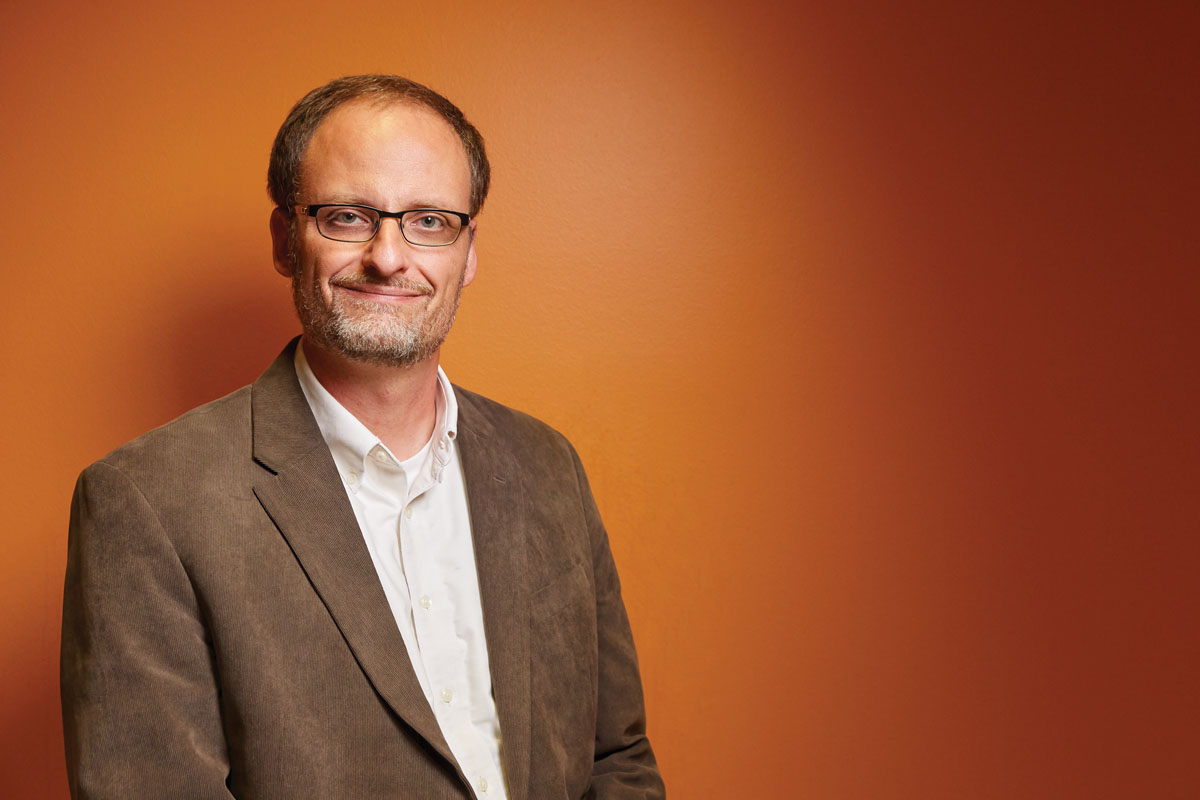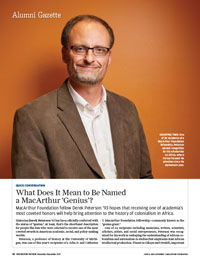Alumni Gazette
 GRANTING TIME: One of 24 recipients of a MacArthur Foundation fellowship, Peterson earned recognition for his scholarship
on Africa, where he has focused his attention since his sophomore year. (Photo: John D. and Catherine T. MacArthur Foundation)
GRANTING TIME: One of 24 recipients of a MacArthur Foundation fellowship, Peterson earned recognition for his scholarship
on Africa, where he has focused his attention since his sophomore year. (Photo: John D. and Catherine T. MacArthur Foundation)Historian’s History
A double major in history and political science, Peterson received a BA (1993) from Rochester and a PhD (2000) from the University of Minnesota.
A professor in the Departments of History and Afro-American and African Studies at the University of Michigan, he has held positions at the College of New Jersey and the University of Cambridge.
He is coeditor of several books, including African Print Cultures: Newspapers and Their Publics in the Twentieth Century (2016), The Politics of Heritage in Africa: Economies, Histories, and Infrastructures (2015), and Recasting the Past: History Writing and Political Work in Modern Africa (2009).
Historian Derek Peterson ’93 has been officially conferred with the status of “genius.” At least, that’s the shorthand description for people like him who were selected to receive one of the most coveted awards in American academic, social, and policy-making worlds.
Peterson, a professor of history at the University of Michigan, was one of this year’s recipients of a John D. and Catherine T. MacArthur Foundation fellowship—commonly known as the “genius grant.”
One of 24 recipients including musicians, writers, scientists, scholars, artists, and social entrepreneurs, Peterson was recognized for his work in reshaping the understanding of African colonialism and nationalism in studies that emphasize East African intellectual production. Fluent in Gikuyu and Swahili, important languages in eastern Africa, Peterson draws on a range of vernacular and English-language sources written by Africans, including record books, diaries, religious pamphlets, syllabi and dictionaries, oral histories, and letters.
According to the foundation, the program, which began in 1981, “is intended to encourage people of outstanding talent to pursue their own creative, intellectual, and professional inclinations.” Famous for awarding its grants—for this year’s class, the award totals $625,000 over five years—with no strings attached, the foundation says the goal is to support “people, not projects.”
What does the grant mean to you?
Africa is a marginal place, when seen from the vantage point of the United States, and African studies scholars usually labor in dignified obscurity. The MacArthur award means a wider readership for my work. I’m currently writing a book about Ugandan dictator Idi Amin, using newly uncovered archival materials to understand how “ordinary” Ugandans dealt with his dysfunctional and violent government. I’m writing that book with the hope of getting it into the hands of a wider audience, outside the university. I think it’s important, in today’s America, that we understand how dictatorships work, how they transform populism into a form of demagoguery.
You’re coordinating an effort to preserve endangered government archives in Uganda—will the grant allow you to do work that you were not able to do before?
For the past 10 years I’ve been working with colleagues in Uganda to rescue, catalog, and digitize endangered archives lying in the hands of local governments. We’ve together created the largest digitized repository of government documents in Africa. The MacArthur grant will allow me to take that work into new media. I’ve just started working with colleagues at the Uganda Broadcasting Corporation on a project to digitize the radio and television archives, which stretch back to the 1960s. MacArthur funds will help pay some of the costs of that work, I hope.
What are your memories of Rochester?
Rochester was a terrific place to be in the early 1990s. I met my future wife, Becky Lorenz Peterson ’95, ’96 (T5), at Rochester. She was my accompanist for a bassoon recital I gave in my junior year. An electrical engineering major at Rochester, she’s now a member of the engineering faculty at Michigan.
I sang in a barbershop quartet called the Touch Tones. We didn’t set new standards for musicality, but we did have a great time together, and we entertained a lot of people. I was the jazz music director for WRUR and had a weekly show at six in the morning. I took lessons in saxophone and bassoon at Eastman and contemplated a career in music. In the summer of my sophomore year I went to Kenya for three months as part of a larger group, and the time I spent living with a Masaai pastor in southern Kenya was a life-changing experience. It taught me how much I had to learn.
After I returned to Rochester I took as many courses as I could about Africa, studying with professor Elias Mandala (about African history) and with the late professor Sam Nolutshungu (about African politics). After I graduated I was fortunate enough to win a Fulbright grant, which took me to Kenya for a full year. That’s were it all started from.
—Sandra Knispel

